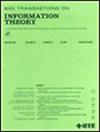A Locality-Based Lens for Coded Computation
IF 2.2
3区 计算机科学
Q3 COMPUTER SCIENCE, INFORMATION SYSTEMS
引用次数: 0
Abstract
Coded computation is an emerging paradigm of applying coding theory to large-scale distributed computing to provide resilience against slow or otherwise unavailable workers. We propose a new approach to view coded computation via the lens of the locality of codes. We do so by defining a new notion of locality, called基于位置的编码计算透镜
编码计算是一种新兴的范例,它将编码理论应用于大规模分布式计算,以提供针对缓慢或不可用的工作的弹性。我们提出了一种从码的局部性角度来看待编码计算的新方法。我们通过定义一个新的局部性概念,称为计算局部性,使用被计算函数的适当定义代码的局部性属性来实现这一点。这种局部性的概念结合了编码计算环境中局部性的独特方面。我们的第一个主要贡献是演示如何使用适当定义的代码的本地恢复方案为函数设计编码计算方案。从Reed-Muller码的局域性角度出发,重新导出了最著名的多元多项式函数的编码计算格式。我们的第二个主要贡献是表明,与现有的编码计算方案相比,所提出的基于位置的方法可以实现新的权衡(例如,通信带宽与工作人员数量)。特别是在输入之间存在已知的线性依赖的情况下(在许多实际应用程序中很常见),建议的方法显着减少了资源开销(即工作人员的数量),而不会产生任何权衡。
本文章由计算机程序翻译,如有差异,请以英文原文为准。
求助全文
约1分钟内获得全文
求助全文
来源期刊

IEEE Transactions on Information Theory
工程技术-工程:电子与电气
CiteScore
5.70
自引率
20.00%
发文量
514
审稿时长
12 months
期刊介绍:
The IEEE Transactions on Information Theory is a journal that publishes theoretical and experimental papers concerned with the transmission, processing, and utilization of information. The boundaries of acceptable subject matter are intentionally not sharply delimited. Rather, it is hoped that as the focus of research activity changes, a flexible policy will permit this Transactions to follow suit. Current appropriate topics are best reflected by recent Tables of Contents; they are summarized in the titles of editorial areas that appear on the inside front cover.
 求助内容:
求助内容: 应助结果提醒方式:
应助结果提醒方式:


